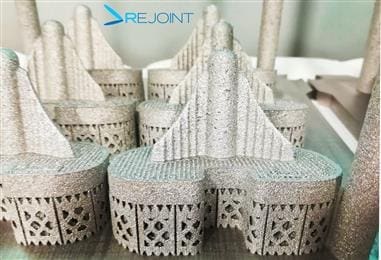CINCINNATI, OH, June 17, 2020 – Italian medical implant manufacturer REJOINT is introducing mass customization and therapy personalization through a combination of Electron Beam Melting (EBM) and computerized analysis of intraoperative and post-operative data collection through IoT-connected sensorized wearables.
Patient specific arthroplasty
The market for knee implants is now estimated at around five million implants per year worldwide. In advanced markets, already in 2011 the number of surgical procedures was 150 per 100,000 inhabitants, with peaks of 250 in some markets such as Austria and Switzerland. The strongest annual increase (7%) occurred in patients 64 years and under.
The knee arthroplasty market until recently solely consisted of standard prosthetic systems, with a limited range of sizes available. Correct and precise sizing and positioning is one of the critical factors for the success of this type of intervention, which is now clinically routine, but still variable in terms of success.
Knee joints have to withstand point loads that can reach levels of over 300 kilograms. Even minimal dimensional changes between the patient’s bone elements and an implant can cause pain and inflammation. For the patient, over- or under-sizing means constant awareness of the presence of an artificial joint, as well as leading to muscle and ligament decay.
Patient feedback after an implant can sometimes reflect these issues and indicates that dissatisfaction can be felt by one in five patients and sometimes even to levels of one in four. Dissatisfaction is often largely related to the suboptimal sizing of the implanted prosthesis.
From the patient’s perspective, there has been a profound change in the criteria for choosing a solution in relation to their indications. While some elderly patients might rely entirely on their doctor to make that choice, younger patients may go online to become better informed on solutions and treatment paths available and choose a surgeon based on the information they gather.
Additive technology and data-driven customization
Based in Bologna, Italy, REJOINT was founded in 2015 by a team with many years of experience in the orthopedic sector, recently entered the knee arthroplasty market.
This innovative company aims to offer a customized medical solution. Both additive manufacturing and artificial intelligence are integral to its growth strategy.
“When it came to additive manufacturing, we were initially undecided about the most suitable solution for personalized cobalt-chrome prosthetics and were evaluating DMLM and EBM. Both modalities, in fact offer a good level of resolution and quality, but we ultimately opted for the GE Additive Arcam EBM Q10plus system. The knowledge and industrialization support that GE was able to provide us and the professional experience of their local team here in Italy also informed our decision,” says Gian Guido Riva, CEO at REJOINT.
“At the moment, ours is still the only solution for additively manufactured knee prostheses in cobalt-chrome to be certified and introduced to the market,” he adds.
To produce the additively manufactured prosthesis, REJOINT starts by 3D modelling the patient’s CT scan. Sophisticated Artificial Intelligence (AI) algorithms are then used to analyze the images and identify the most suitable size for each specific case.
AI is used to compare the unique anatomy of a patient on several thousand prosthetic dimensions, each with as many dimensional variables in specific areas of the implant.
The surgeon is then offered the optimal configuration, for positioning both the prosthetic components and for simulating the operation. This analysis forms the basis for the production of the prosthesis and for patient-specific tools for the planning of the intervention – which is carried out with the support of computer-aided surgery tools.
“Having all this data made us realize that we could link it to the information recorded during the operation. And in turn, this data could still be further improved upon if we could collect through the use of wearable devices (such as sensorized headbands and socks), both pre- and post-operative measurements, on how the patient loads their limb or bends their knee, until post-operative evaluation questionnaires have been completed,” continues Riva.
This innovative approach, which is now part of REJOINT’s high value-added offering, makes it possible to identify a series of correlations that trace the whole process, from the interactive preoperative planning right through to the rehabilitation phase.
“By 2022, we will have the complete data of thousands of cases available. This will provide us with an unparalleled wealth of application information, in terms of completeness, in the sector. Despite the sale of millions of pieces, there is little or no information on what happens post-sale,” continues Riva.
According to Professor Maurilio Marcacci, head of the Joint Knee Reconstruction Centre at Humanitas Research Hospital in Milan, who performed the first implant, the initial application of this technology has achieved a high degree of patient satisfaction, that are unprecedented in his many years of experience.
Future developments
The company is currently in the process of obtaining US Food & Drug Administration, FDA 510(k) clearance, which is expected in the first half of 2021. Certification will mean access to the US market, which accounts for 62% of the world market for orthopedic devices and more than 70% of the value of the global market for knee implants.
REJOINT is working with GE Additive to reduce powder-based production costs, focusing on the reduction of cycle times and the optimization of parameters – including through the development of remote production control stations.
For younger or less acute patients, REJOINT is also developing a single-compartment prosthetic system with a minimally invasive design and robotic surgical technology.
“The key element, is an increasingly close and direct relationship between company and patient. This will further increase the degree of post-operative satisfaction. We are at the beginning of a revolution in the field of knee implants. REJOINT’s work in adopting additive technology will allow for more personalized procedures and higher levels of long-term patient satisfaction”, adds Riva.

